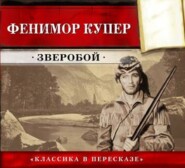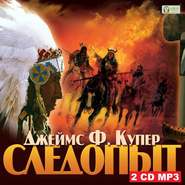По всем вопросам обращайтесь на: info@litportal.ru
(©) 2003-2024.
✖
The Spy: Condensed for use in schools
Настройки чтения
Размер шрифта
Высота строк
Поля
“’Twas the hut of the peddler,” muttered the leader of the gang; “we have not left him a shingle for shelter; I should have burned it months ago, but I wanted his shed for a trap to catch the sly fox in.”
“You seem a most ingenious patriot,” said Lawton. “Major Dunwoodie, I second the request of this worthy gentleman, and crave the office of bestowing the reward on him and his fellows.”
“Take it; – and you, miserable man, prepare for the fate which will surely befall you before the setting of to-morrow’s sun.”
“Life offers but little to tempt me with,” said Harvey, slowly raising his eyes and gazing wildly at the strange faces in the apartment.
“Come, worthy children of America!” said Lawton, “follow and receive your reward.”
The gang eagerly accepted the invitation, and followed the captain towards the quarters assigned to his troop.
The officer to whose keeping Dunwoodie had committed the peddler, transferred his charge to the custody of the regular sergeant of the guard. After admonishing the non-commissioned guardian of Harvey to omit no watchfulness in securing the prisoner, the youth wrapped himself in his cloak, and, stretched on a bench before a fire, soon found the repose he needed. A rude shed extended the whole length of the rear of the building, and from off one end had been partitioned a small apartment that was intended as a repository for many of the lesser implements of husbandry. The considerate sergeant thought this the most befitting place in which to deposit his prisoner until the moment of execution.
Several inducements urged Sergeant Hollister to this determination, among which was the absence of the washerwoman, who lay before the kitchen fire, dreaming that the corps was attacking a party of the enemy, and mistaking the noise that proceeded from her own nose for the bugles of the Virginians sounding the charge. Another was the peculiar opinions that the veteran entertained of life and death, and by which he was distinguished in the corps as a man of most exemplary piety and holiness of life. Captain Lawton had rewarded his fidelity by making him his orderly.
Followed by Birch, the sergeant proceeded in silence to the door of the intended prison, and, throwing it open with one hand, he held a lantern with the other to light the peddler to his prison.
Harvey thoroughly examined the place in which he was to pass the night, and saw no means of escape. He buried his face in both hands, and his whole frame shook; the sergeant regarded him closely, took up the lantern, and, with some indignation in his manner, left him to sorrowful meditations on his approaching fate. Birch sank, in momentary despair, on the pallet of Betty, while his guardian proceeded to give the necessary instructions to the sentinels for his safe-keeping.
Hollister concluded his injunctions to the man in the shed by saying, “Your life will depend on his not escaping. Let none enter or quit the room till morning.”
“But,” said the trooper, “my orders are to let the washerwoman pass in and out as she pleases.”
“Well, let her then; but be careful that this wily peddler does not get out in the folds of her petticoats.” He then continued his walk, giving similar orders to each of the sentinels near the spot.
For some time after the departure of the sergeant, silence prevailed within the solitary prison of the peddler, until the dragoon at his door heard his loud breathings, which soon rose into the regular cadence of one in deep sleep. The man continued walking his post, musing on an indifference to life which could allow nature its customary rest, even on the threshold of the grave.
His meditations were, however, soon interrupted by the approach of the washerwoman, who came staggering through the door that communicated with the kitchen, muttering execrations against the servants of the officers, who, by their waggery, had disturbed her slumbers before the fire. The sentinel understood enough of her curses to comprehend the case; but all his efforts to enter into conversation with the enraged woman were useless, and he suffered her to enter her room without explaining that it contained another inmate. The noise of her huge frame falling on the bed was succeeded by a silence that was soon interrupted by the renewed respiration of the peddler, and within a few minutes Harvey continued to breathe aloud, as if no interruption had occurred. The relief[83 - change of sentinel.] arrived at this moment, and at the same time, the door of the prison was opened and Betty reappeared, staggering back again toward her former quarters.
CHAPTER XIII.
THE SKINNERS’ REWARD
The Skinners followed Captain Lawton with alacrity towards the quarters occupied by the troop of that gentleman. They soon arrived at a better sort of farm-house, the very extensive out-buildings of which were in tolerable repair, for the times. Lawton excused himself for a moment, and entered his quarters. He soon returned, holding in his hand one of the common stable-lanterns, and led the way towards a large orchard that surrounded the buildings on three sides. The gang followed the trooper in silence. Approaching the captain, the Skinner said, “Do you think the colonies will finally get the better of the king?”
“Get the better!” echoed the captain, with impetuosity; then checking himself, he continued, “no doubt they will. If the French[84 - French aid was given the Americans.] will give us arms and money, we can drive out the royal troops in six months.”
“Well, so I hope we shall soon; and then we shall have a free government, and we, who fight for it, will get our reward.”
“Oh!” cried Lawton, “your claims are indisputable; while all these vile Tories[85 - Colonists, who favored the British.] who live at home peaceably, to take care of their farms, will be held in the contempt they merit. You have no farm, I suppose?”
“Not yet; but it will go hard if I do not find one before the peace is made.”
“Right; study your own interests, and you study the interests of your country; press the point of your own services and rail at the Tories, and I’ll bet my spurs against a rusty nail that you get to be a county clerk at least. Men who have nothing, act as if the wealth of the Indies depended on their fidelity; all are not villains like yourself, or we should have been slaves to England years ago.”
“How!” shouted the Skinner, starting back, and dropping his musket to the level of the other’s breast; “am I betrayed, and are you my enemy?”
“Miscreant!” shouted Lawton, his sabre ringing in its steel scabbard as he struck the musket of the fellow from his hands; “offer but again to point your gun at me, and I’ll cleave you to the middle.”
“And you will not pay us, then, Captain Lawton?” said the Skinner, trembling in every joint, for just then he saw a party of mounted dragoons silently encircling his whole party.
“Oh! pay you – yes, you shall have the full measure of your reward. There is the money that Colonel Singleton sent down for the captor of the spy,” throwing a bag of guineas with disdain at the other’s feet. “But ground your arms, you rascals, and see that the money is truly told.”[86 - counted.]
The intimidated band did as they were ordered, and while they were eagerly employed in this pleasing avocation, a few of Lawton’s men privately knocked the flints out of their muskets.
“Well,” cried the impatient captain, “is it right – have you the promised reward?”
“There is just the money,” said the leader, “and we will now go to our homes, with your permission.”
“Hold! so much to redeem our promise – now for justice; we pay you for taking the spy, but we punish you for burning, robbing, and murdering. Seize them, my lads, and give each of them the law of Moses – forty save one.”
This command was given to no unwilling listeners, and in the twinkling of an eye the Skinners were stripped and fastened by the halters of the party to as many of the apple trees as were necessary to furnish one to each of the gang. Swords were quickly drawn, and fifty branches were cut from the trees like magic; from these were selected a few of the most supple of the twigs, and a willing dragoon was soon found to wield each of the weapons.
Captain Lawton gave the word, humanely cautioning his men not to exceed the discipline prescribed by the Mosaic law, and the uproar of Babel commenced in the orchard. The flagellation[87 - whipping.] was executed with great neatness and despatch, and it was distinguished by no irregularity, excepting that none of the disciplinarians began to count until he had tried his whip by a dozen or more blows, by the way, as they said themselves, of finding out the proper place to strike. As soon as this summary operation was satisfactorily completed, Lawton directed his men to leave the Skinners to replace their own clothes and to mount their horses, for they were a party who had been detached for the purpose of patrolling lower down in the county.
“You see, my friend,” said the captain to the leader of the Skinners, after he had prepared himself to depart, “I can cover you to some purpose when necessary. If we meet often, you will be covered with scars, which, if not honorable, will at least be merited.”
The fellow made no reply. He was busy with his musket, and hastening his comrades to march; when, everything being ready, they proceeded sullenly towards some rocks at no great distance, which were overhung by a deep wood. The moon was just rising, and a troop of dragoons could easily be distinguished where they had been left. Suddenly turning, the whole gang levelled their pieces and drew their triggers. The action was noticed, and the snapping of the locks was heard by the soldiers, who returned their futile attempt with a laugh of derision, the captain crying aloud:
“Ah! rascals, I knew you, and have taken away your flints.”
“You should have taken away that in my pouch, too,” shouted the leader, firing his gun in the next instant. The bullet grazed the ear of Lawton, who laughed as he shook his head, saying: “A miss is as good as a mile.” One of the dragoons had seen the preparations of the Skinner – who had been left alone by the rest of the gang as soon as they had made their abortive[88 - unsuccessful.] attempt at revenge – and was in the act of plunging his spurs into his horse as the fellow fired. The distance to the rocks was but small, yet the speed of the horse compelled the leader to abandon both money and musket to effect his escape. The soldier returned with his prizes, and offered them to the acceptance of his captain; but Lawton rejected them, telling the man to retain them himself until the rascal appeared in person to claim his property.
The patrol departed, and the captain slowly returned to his quarters with an intention of retiring to rest. A figure moving rapidly among the trees in the direction of the wood whither the Skinners had retired caught his eye, and, wheeling on his heel, the cautious partisan approached it, and, to his astonishment, saw the washerwoman at that hour of the night, and in such a place.
As the captain entered his quarters the sentinel at the door inquired if he had met Mrs. Flanagan, and added that she had passed there filling the air with threats against her tormentors at the “Hotel?” and inquiring for the captain in search of redress. Lawton heard the man in astonishment, appeared struck with a new idea – walked several yards towards the orchard, and returned again; for several minutes he paced rapidly to and fro before the door of the house, and hastily entering it, he threw himself on a bed in his clothes and was soon in a profound sleep.
CHAPTER XIV.
THE DOUBLE WARNING
While his comrades were sleeping in perfect forgetfulness of their hardships and dangers, the slumbers of Dunwoodie were broken and unquiet. After spending a night of restlessness he arose, unrefreshed, from the rude bed where he had thrown himself in his clothes, and without awaking any of the group around him he wandered into the open air in search of relief. In this disturbed state of mind the major wandered through the orchard, and was stopped in his walk by arriving at the base of those rocks which had protected the Skinners in their flight, before he was conscious whither his steps had carried him. He was about to turn and retrace his path to his quarters, when he was startled by a voice, bidding him —
“Stand or die!”
Dunwoodie turned in amazement, and beheld the figure of a man placed at a distance above him on a shelving rock with a musket levelled at himself. The light was not sufficiently powerful to reach the recesses of that gloomy spot, and a second look was necessary before he discovered, to his astonishment, that the peddler stood before him. Comprehending in an instant the danger of his situation, and disdaining to implore mercy or retreat, had the latter been possible, the youth cried firmly:
“If I am to be murdered, fire! I will never become your prisoner.”
“No, Major Dunwoodie,” said Birch, lowering his musket, “it is neither my intention to capture nor to slay.”
“What then would you have, mysterious being?” said Dunwoodie, hardly able to persuade himself that the form he saw was not a creature of the imagination.
“Your good opinion,” answered the peddler, with emotion; “I would wish all good men to judge me with lenity.[89 - gentleness, kindness.] Major Dunwoodie, danger is near them you love most – danger within and without – double your watchfulness – strengthen your patrols – and be silent. With your opinion of me, should I tell you more, you would suspect an ambush. But remember and guard them you love best.”
The peddler discharged his musket in the air, and threw it at the feet of his astonished auditor. When surprise and the smoke allowed Dunwoodie to look again on the rock where he had stood, the spot was vacant.
The youth was aroused from the stupor which had been created by this strange scene, by the trampling of horses, and the sound of bugles. A patrol was drawn to the spot by the report of the musket, and the alarm had been given to the corps. Without entering into any explanation with his men, the major returned quickly to his quarters, followed by many of his officers, and preceded by Sergeant Hollister, went to the place which was supposed to contain the peddler.

















